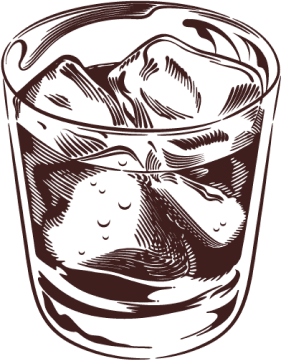- Reminders
- Whisky
- Blog

Whisky: An Introduction Part 1


Whether it’s whisky, whiskey, Scotch or uisge beatha - the world of whisky can be confusing.
As the inaugural post in our WhiskyGenius blog I thought it would be useful to lay out exactly what whisky is, and to go through some of the fundamentals.
At its most broad, whisky can be defined as ‘a spirit distilled from grain and matured in wooden casks’.
Single Malt Versus Blended Whisky
Blended whisky is made up from a variety of different types of grain (e.g. corn, rye, barley, grain, etc.) and makes up the vast majority of the whisky market. Often the liquid being ‘blended’ comes from a variety of distilleries. For example, Johnnie Walker, the world’s best selling whisky, is made up of whisky made from 30+ different distilleries. Alongside Johnny Walker other blended whisky powerhouses include brands such as Chivas Regal, Ballantine’s, and Grant’s.
Single malt whisky, in contrast, is made solely from malted barley. Malted barley is barley that has been allowed to start germinating by being soaked in water. It is also the key base for most of the worlds’ most popular beers. Famous Scottish examples include brands such as Laphroaig, Glenlivet, and perhaps the biggest of them all, Macallan.
Whisky and Whiskey?
Whether you include an e in your whisk(e)y depends mainly on where you are. Typically Irish and American whiskey includes the e, whilst Scottish, Japanese, Indian, and Canadian whisky do not.

In reality it doesn’t matter. There is a huge range of flavour profiles and techniques used all over the world, and you can’t read too much into the ‘e’.
How Long Do You Need to Age Whisky?
Unlike wine, whisky doesn’t age in the bottle - meaning the entire maturation process happens when the whisky is in the cask.
Many bottles display an age statement on the label. This refers to how many years the liquid itself sat in a wooden cask. The age statement is then based on the youngest drop in the bottle, meaning all the whisky has to be at least as old as the age statement.
This then begs the question, how long should you age your whisky?
The answer depends on where the whisky is being made. Across the EU, UK, and Canada, whisky has to be aged for at least three years. In America, it depends on the type of whisky, but typically has to be aged for ‘some time’. Finally, Australia goes for a 2-year maturation minimum.
There is no legal necessity to put an age statement on the bottle. In these cases the whiskies are referred to as having ‘no age statement’, or ‘NAS’.
Do I Have to Drink My Whisky Neat?
No.
Whilst in Scotland there is a prevailing bias that whisky must be drunk neat, sat in front of a fireplace with a dog at your feet - this is not always the case.
Many imbibers tend to add a dash of water to their whisky. This both dilutes the alcohol and can open up a drink quite a bit, changing the flavour profile. For many whiskies this may in fact make it more palatable.
Ice also makes a big difference. Adding ice not only dilutes the whisky, but also restricts the breadth of flavour you’re likely to take from it (this is why all cheap shots are ice-cold). For a particularly aggressive whisky this may be helpful.
Adding a mixer such as cola or ginger beer, typically makes the whisky taste like cola or ginger beer. If it’s not a great whisky, or you're in the mood for a boozy cola - then this could be a good idea.
As long as you’re enjoying the whisky, that’s all that matters.
Know Your Label: Standard Whisky Terms
ABV - Alcohol by volume. Whisky has to legally be above 40% to be called whisky.
Cask Strength - The majority of whiskies available have been diluted down to around 40% ABV. This is to make the whisky more approachable, as most drinkers aren’t looking for something that will blow your socks off. In contrast, cask strength whisky hasn’t been diluted and comes at a much higher ABV. The main benefit to this is that it allows the drinker to choose how strong they’d like their whisky. If they’re after a punchy high ABV dram, then they may choose not to dilute the whisky at all. If they’d like something smoother - then they can simply add some water.
Single Cask - Whilst all whisky is matured in casks, the vast majority are then ‘vatted’ before bottling. This involves combining many different casks together in a big vat to standardise the flavour profile. In contrast, single cask whiskies come from one barrel, and have a far more idiosyncratic flavour profile. Coming from a single barrel also means that there are far fewer bottles available than a traditional release. This combination: an interesting flavour, and scarcity, leads to most of the most sought after and expensive whisky on the market being ‘single cask’ releases.
Reracked/Finished - Initially championed by The Balvenie, reracking involves moving whisky from the cask it is being matured into another empty cask for ‘finishing’. This second cask will typically have been used to mature something else before hand (most commonly sherry), meaning the wood will impart a new flavour to the whisky.
Uisge beatha - Gaelic for “water of life”. A very traditional name for whisky. Useful if you’re stuck in the Scottish Outer Hebrides, or else if you want to sound a little pretentious.
Slàinte - Pronounced ‘Slawn - che’, Slàinte is gaelic for health. It’s used much the same way as ‘Cheers!’ before enjoying a good dram.
This is part 1 of the WhiskyGenius blog. For more information on whisky movers and shakers, what to try, what to avoid, and how to get the most out of your whisky - watch this space…










-748a73f1-2896-4725-8338-2ce5b7f0b4f9.png/height=264,width=470)

